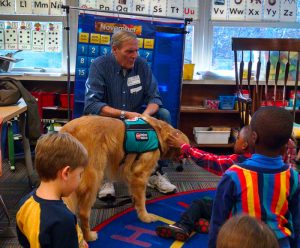
Falk College faculty in public health and social work are researchers in a new integrative health study that measures the effects of owning and training a therapy dog on posttraumatic stress disorder (PTSD) in veterans. Published in The Journal of Alternative and Complementary Medicine, “Dog Ownership and Training Reduces Post-Traumatic Stress Symptoms and Increases Self-Compassion Among Veterans: Results of a Longitudinal Control Study” is coauthored by Dessa Bergen-Cico, Ph.D., Yvonne Smith, Ph.D., Collin Gooley, and Brooks Gump, Ph.D. at Syracuse University; Karen Wolford, Ph.D. at SUNY Oswego, and; Kathleen Hannon, Ryan Woodruff, and Melissa Spicer, Clear Path for Veterans.
Researchers reported significant reductions in PTSD symptoms, as well as reductions in perceived stress, isolation, and self-judgement, and significant increases in self-compassion when comparing the veterans that participated in the Dogs2Vets program over a 12-month period to veterans that were on the waiting list to receive a dog during that time period.
“The short story here is that dogs may be the best friend for a veteran with PTSD who engages in this training program,” says JACM Editor-in-Chief John Weeks. “It is remarkable when research suggests that the best medicine for such a gnawing condition may be as close at hand and simple as this.”
